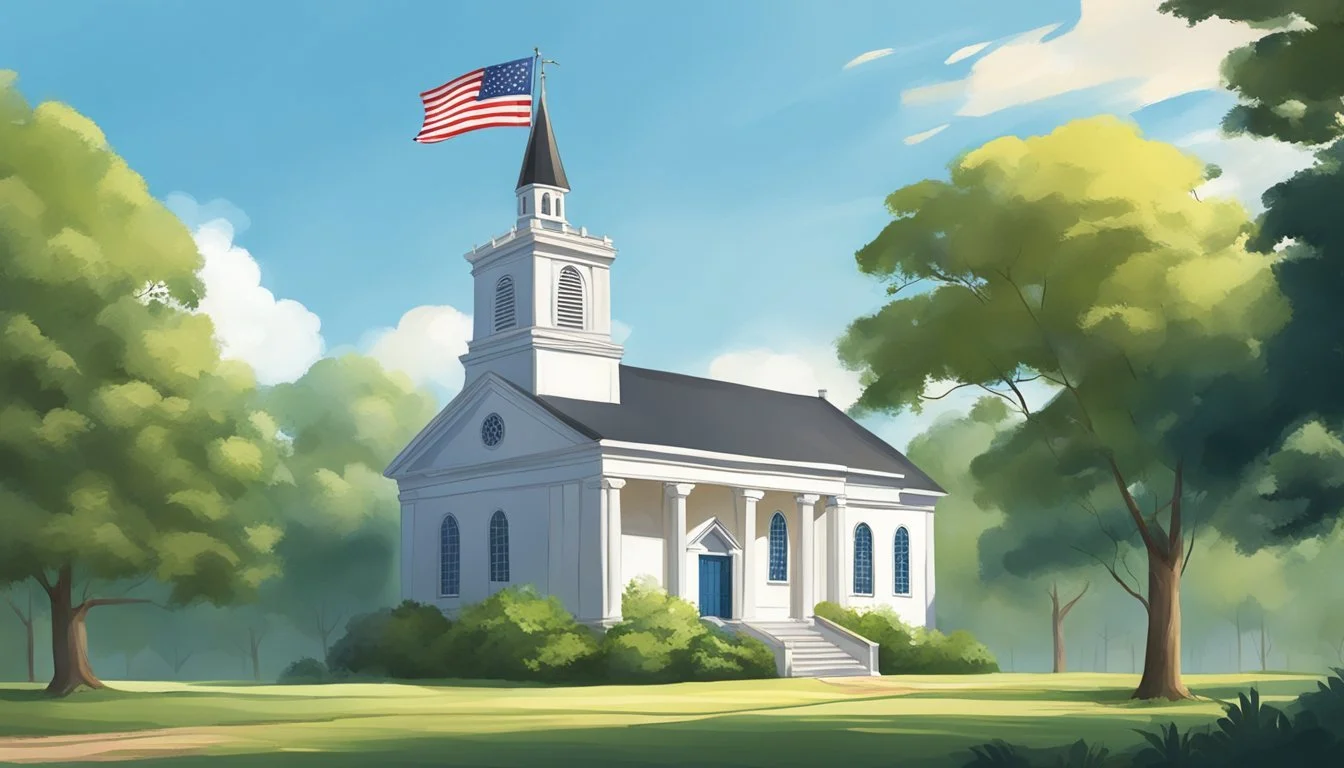Shocking Revelations: 'God and Country' Documentary Exposes the Threat of Christian Nationalism!
The "God & Country" documentary, released in 2024, examines the rise of Christian Nationalism in the United States. This film explores how the movement blurs the line between church and state, potentially threatening both democracy and Christianity itself. Directed by Dan Partland and produced by Rob Reiner, the documentary is based on Katherine Stewart's book "The Power Worshippers."
"God & Country" features prominent Christian voices and experts who oppose the ideology of Christian Nationalism. These individuals warn of the consequences this movement could have for America's political and religious landscape. The film aims to shed light on the dangers of mixing religious beliefs with governmental power.
Viewers can stream "God & Country" on platforms like Prime Video and Freevee. The documentary has gained attention for its timely examination of a controversial topic, sparking discussions about the role of religion in American politics and the potential impacts on society.
Historical Context
The intertwining of religion and politics in the United States has deep roots, shaping the nation's identity and governance. This complex relationship has evolved over time, leading to significant debates about the role of faith in public life.
Nation Under God
The phrase "under God" was added to the Pledge of Allegiance in 1954, during the Cold War era. This addition aimed to differentiate the U.S. from the atheistic Soviet Union.
The motto "In God We Trust" became official on U.S. currency in 1956. These changes reflected a broader push to emphasize America's religious character.
Religious language in public spaces increased during this period. School prayer and Bible readings were common until Supreme Court rulings in the 1960s declared them unconstitutional.
Rise of Christian Nationalism
Christian nationalism gained momentum in the late 20th century. The Moral Majority, founded in 1979, sought to influence politics based on conservative Christian values.
This movement advocated for prayer in schools, opposition to abortion, and traditional family values. It aligned closely with the Republican Party, shaping political discourse.
The 21st century saw further growth of Christian nationalist ideas. Some groups began pushing for Christianity to have a more prominent role in government and education.
Critics argue this trend threatens the separation of church and state. They warn it could lead to discrimination against religious minorities and non-believers.
Key Figures
"God & Country" features contributions from prominent scholars, activists, and religious figures who offer insights into Christian nationalism's impact on American politics and society.
Contributors Overview
Dan Partland directed the documentary, while Rob Reiner served as producer. The film draws heavily from Katherine Stewart's book "The Power Worshippers." Stewart herself appears as a key expert, providing context on religious nationalism's rise.
Other notable contributors include David French, a conservative writer critical of Christian nationalism, and Simone Campbell, a Catholic nun and social justice advocate. Reza Aslan, a religious studies scholar, offers analysis on the intersection of faith and politics.
Spotlight on Thought Leaders
Rob Schenck, a former evangelical leader turned critic of the religious right, provides an insider's perspective on Christian nationalist movements. His firsthand experiences lend credibility to the film's examination of these groups' strategies and goals.
William J. Barber II, a Protestant minister and civil rights activist, discusses the contrast between Christian nationalism and social justice-oriented faith traditions. Andrew Whitehead, a sociologist studying religion in America, shares research on Christian nationalism's prevalence and influence.
These experts collectively paint a detailed picture of Christian nationalism's complexities and potential consequences for American democracy.
The Film's Core Message
"God & Country" delivers a stark warning about Christian nationalism's rising influence in American politics and society. The documentary examines how this ideology intertwines religious beliefs with political power, potentially undermining democratic principles.
Exploring Belief and Power
Christian nationalism blends religious convictions with political aspirations. The film argues this movement seeks to reshape America's governance based on a particular interpretation of Christianity. It highlights how some leaders use faith to justify policy positions and mobilize supporters.
The documentary features interviews with religious scholars, political analysts, and concerned citizens. These voices express alarm over the growing fusion of Christian identity with national identity. They warn of potential threats to religious pluralism and secular governance.
Implications of Christian Nationalism
The film contends that Christian nationalism poses significant risks to American democracy. It suggests this ideology may erode the separation of church and state, a foundational principle of the U.S. Constitution.
"God & Country" explores how Christian nationalist beliefs can lead to discrimination against religious minorities and non-believers. The documentary examines historical parallels, drawing connections between current trends and past instances of religious nationalism.
The film urges viewers to consider the long-term consequences of allowing one religious perspective to dominate political discourse and policy-making. It emphasizes the importance of maintaining a diverse, inclusive society that respects all faith traditions and secular worldviews.
Cinematic Elements
"God & Country" employs compelling visual storytelling and audio techniques to examine Christian nationalism in America. The film's cinematic approach enhances its exploration of this complex topic.
Visual and Narrative Techniques
The documentary utilizes a mix of interviews, archival footage, and graphical elements to convey its message. Experts and religious figures appear on screen, providing insights into Christian nationalism. Historical clips and news segments illustrate key events and trends. Animated infographics help explain complex concepts and data.
The PG-13 rated film maintains a balanced visual tone, avoiding sensationalism. Shots of church services, political rallies, and everyday American life are interwoven to create a comprehensive picture. The editing rhythm alternates between fast-paced montages and slower, contemplative sequences to emphasize different points.
Music and Sound Design
The soundtrack of "God & Country" plays a crucial role in setting the emotional tone. Original compositions blend with carefully selected existing tracks to underscore the film's themes. Somber piano melodies often accompany serious discussions, while more energetic music accompanies segments on political activism.
Sound design enhances the viewing experience through subtle atmospheric effects. Crowd noise from rallies, church hymns, and ambient sounds of American cities create an immersive audio landscape. Voice-over narration guides viewers through complex topics, with clear audio mixing ensuring important dialogue is never obscured by background elements.
Public Reception
"God & Country" sparked discussion about Christian nationalism's influence on American politics and society. The documentary elicited diverse reactions from critics and viewers alike.
Critical Response
Critics praised "God & Country" for its timely exploration of Christian nationalism. Many reviewers highlighted the film's balanced approach, featuring insights from scholars, activists, and religious leaders. Some critics noted the documentary's effectiveness in explaining complex theological and political concepts to a general audience.
The film's connection to Katherine Stewart's book "The Power Worshippers" was viewed positively, adding depth to the documentary's analysis. Critics appreciated the film's focus on education, shedding light on how Christian nationalist ideas impact school curricula and policies.
Viewer Impressions
Audience reactions to "God & Country" varied widely. Many viewers found the documentary eye-opening, gaining new insight into the intersection of religion and politics in the United States. Some expressed concern about the potential threats to democracy highlighted in the film.
The documentary resonated strongly with those already aware of Christian nationalism's influence. It sparked conversations about religious freedom and the separation of church and state. Some viewers criticized the film for what they perceived as bias against conservative Christians.
Social media discussions reflected the polarized nature of the topic, with heated debates about the documentary's portrayal of Christian nationalism and its implications for American society.
The Role of Media
Media plays a crucial part in shaping public discourse around religion and politics. Documentaries and films serve as powerful tools for education and raising awareness on complex social issues.
Documentary Influence
"God & Country" exemplifies the impact of documentaries in exploring sensitive topics. Directed by Dan Partland and produced by Rob Reiner, this film examines the rise of Christian nationalism in the United States. It brings attention to the intersection of religion and politics, using interviews and expert analysis to present its case.
The documentary's release in select theaters nationwide amplifies its reach. Its basis on Katherine Stewart's book "The Power Worshippers" lends credibility to its content. By featuring interviews with diverse voices, including representatives from Americans United, the film offers multiple perspectives on the subject.
Film as an Educational Tool
Documentaries like "God & Country" serve as educational resources, informing viewers about complex societal issues. They present information in an accessible format, combining visual elements with expert commentary. This approach helps audiences grasp nuanced topics more easily than through text alone.
The film's availability on platforms like Tubi increases its accessibility. Viewers can engage with the content at their convenience, promoting wider dissemination of information. Trailers for such documentaries act as teasers, sparking interest and encouraging further exploration of the subject matter.
Through careful editing and presentation, documentaries can highlight key points and foster critical thinking. They often include data, historical context, and real-world examples to support their arguments and educate viewers effectively.
Looking Ahead
The future relationship between religion and government in America remains uncertain. Key issues include the role of faith in politics and potential shifts in the separation of church and state.
Future of Church and State
Constitutional challenges may arise as some push for increased religious influence in government. Courts could face cases on issues like prayer in schools, religious symbols on public property, and faith-based policy initiatives. Legislative efforts may seek to expand religious exemptions or protections.
Demographic changes could impact church-state dynamics. A more diverse population may lead to debates over accommodating various faiths. The rising number of religiously unaffiliated Americans may also shape policies and court decisions.
Technology presents new considerations for religious freedom and government entanglement. Online spaces blur lines between public and private religious expression. Data privacy concerns intersect with faith practices and government surveillance.
Continued Dialogue
Interfaith coalitions may emerge to foster understanding across belief systems. These groups could work to find common ground on social issues while respecting differences. Educational initiatives may help increase religious literacy and reduce misconceptions.
Public forums and academic research will likely explore the historical context of church-state separation. Scholars may analyze how different interpretations have evolved over time. This could inform ongoing legal and policy debates.
Media coverage will play a role in shaping public perception of religious influence in politics. Fact-checking efforts may help counter misinformation about faith and government. Social media could amplify diverse voices in these discussions.




